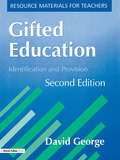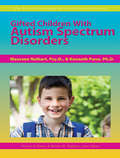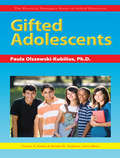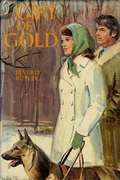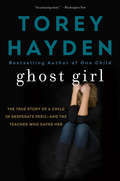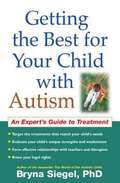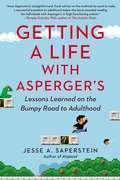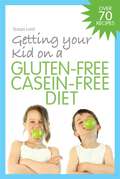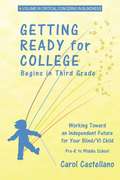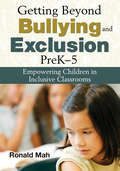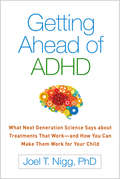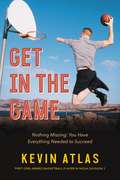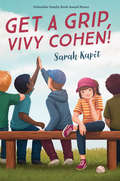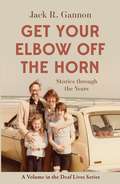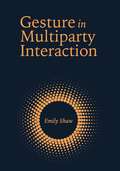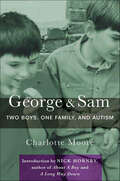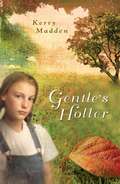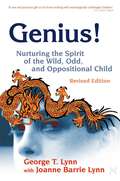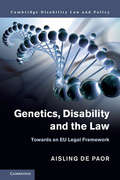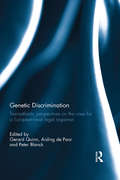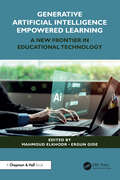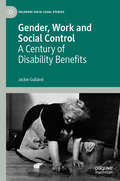- Table View
- List View
Gifted Education: Identification and Provision (Resource Materials For Teachers Ser.)
by David GeorgeThis second edition provides busy teachers, other educational professsionals and parents with user-friendly text and worksheets to enable them to identify and provide provision for The author takes a multi-dimensional view of ability and believes in educating the whole child, with a curriculum of opportunity that provides high-level learning experiences. The book has been updated in view of the developments in the education of gifted and talented children, with particular attention paid to strategies for differentiation, thinking skills and subject-specific enrichment. This book is a practical companion tot he author's popular The Challenge of the Able Child. By using many photocopiable worksheets and helpful checklists, and always bearing in mind the needs of the busy practitioner, this book will useful for anyone working in this area of education. Teachers, GATCOs, teaching assistants and parents should find the information clear and the suggested strategies rooted in good practice for teaching children of all abilities.
Gifted Children With Autism Spectrum Disorders
by Maureen Neihart Kenneth PoonThis new series offers timesaving books on critical topics for educating students with autism spectrum disorders. The four books in this series are filled with practical information and advice, thus making them an ideal resource for classroom teachers, preservice teachers, and graduate students. How can teachers effectively meet the needs of gifted students with autism spectrum disorders in their classrooms? This book explores the array of issues that surround this dual exceptionality. The characteristics and needs of these students are discussed, including issues surrounding sensory integration problems, planning and organization difficulties, social competence, and educational placement decisions.
Gifted Adolescents
by Paula Olszewski-KubiliusThe series offers 25 timesaving books on critical topics for educating gifted learners. Filled with practical information and advice, these books are ideal for classroom teachers, preservice teachers, and graduate students. In preparing this series, the authors have kept the busy classroom teacher in mind. The result is a timesaving introduction to the most important issues in gifted education.
Gift of Gold
by Beverly Butler<P>When Cathy Wheeler decided to become a speech therapist, she faced more than ordinary problems. Cathy was blind, and her speech department chairman said she had chosen an unrealistic profession. Even with sight, controlling young patients would be difficult, and to depend on other senses to work successfully with children would take extraordinary talent and alertness. <P>But Cathy had courage--backed up by a golden dream. An eye doctor had said that part of her sight might be restored. Not only would resistance to her chosen career stop, but Cathy knew she would find it easier to make up her mind about Greg and Steve, the two very different men in her life. <P>But suppose the verdict at the final eye examination went against her? Cathy wondered if she would have the courage then to stand on her own two feet and prove that she could handle a career in speech therapy. How would it affect her feelings about Greg and Steve? How would they feel about her?
Ghost Girl: The True Story Of A Child In Desperate Peril - And A Teacher Who Saved Her
by Torey HaydenJadie never spoke. She never laughed, or cried, or uttered any sound. Despite efforts to reach her, Jadie remained locked in her own troubled world . . . until one remarkable teacher persuaded her to break her self-imposed silence.Nothing in all of Torey Hayden’s experience could have prepared her for the shock of what Jadie told her—a story too horrendous for Torey’s professional colleagues to acknowledge. Yet a little girl was living in a nightmare, and Torey responded in the only way she knew how—with courage, compassion, and dedication—demonstrating once again the tremendous power of love and the resilience of the human spirit.
Getting the Best for Your Child with Autism
by Bryna SiegelAs the parent of a child with an autism spectrum disorder, you need an informed, caring advocate who can deftly guide you through the complex maze of treatment options. In this empowering resource, bestselling author Bryna Siegel--one of the world's leading authorities on the disorder--helps you zero in on proven strategies and tailor them to fit your child's unique needs. Like no other book, Getting the Best for Your Child with Autism shows how to get an accurate assessment of your child's strengths and weaknesses so you can develop a plan of action suited to his or her individual learning style, interests, verbal abilities, and social skills. You'll learn what services you're entitled to, how to determine what's right for your family, and ways to work effectively with doctors and school professionals. With Dr. Siegel as your ally, you can help your child learn and grow.
Getting a Life with Asperger's
by Jesse A. SapersteinHard-won insights on transitioning into adulthood Author, speaker, and autism advocate Jesse A. Saperstein knows a lot about living with Asperger's. Diagnosed at the age of 14, Jesse has struggled, triumphed, flubbed, soared, educated, and inspired. Along the road to adulthood, he has learned many lessons the hard way. In this honest and engaging book, he offers a guided tour of what he's learned about getting along with others, managing emotions, succeeding in school and work, building relationships, and more. Among his Asperger's Rules are: Clean Up Your Own Mess (including but not limited to credit card debt, out-of-control collections, and your cesspool of a room) You Can't Bail Out the Titanic with a Wine Glass (or change the world of online dating) Serving as a Role Model to the Next Generation of Asperger's Syndrome Navigating the challenges of college and the unrelenting storm of transition. The Road to Catastrophe is Paved with Good Intentions (understanding how others perceive you, even if they're wrong) WIN (Work Is Necessary) You are talented enough to maintain employment even if your options are not ideal Confronting Memories of Bullying and Showing Mercy toward Yourself Heartfelt, insightful, and generous, this book will enlighten and inform readers, whether they are on the autism spectrum or not.
Getting a Job 101 An E Book for Teens & Adults with LD
by Ncld Editorial TeamWhatever your educational credentials — high school diploma, college degree, post-secondary certificate, or none of these – there are many steps you can take to prepare for the job market. Throughout this e-book, we will show you how to leverage your strengths to find a job you enjoy
Getting Your Kid on a Gluten-Free Casein-Free Diet
by Susan LordGluten-free casein-free diets are widely used to improve cognitive function, speech patterns, behavior, and general well-being in children on the autistic spectrum. Written by a registered dietician and mother of a child who is thriving on a gluten-free casein-free diet, this practical guide covers everything from how to get your child on the diet, to daily meal plans, recipes and handy shopping lists. Susan Lord offers sound nutritional advice on how to implement the diet correctly, without harming your child by omitting major nutrient groups. Whether you are a parent or care-giver, this book will make removing gluten and casein from an autistic child's diet simple and stress-free. The easy-to-follow meal plans, complete with delicious recipes and ingredient lists, will guide you with confidence in providing a nutritionally-balanced diet for your child, as well as healthy meals the whole family will enjoy.
Getting Ready for College Begins in Third Grade: Working Toward an Independent Future for Your Blind/Visually Impaired Child (Critical Concerns in Blindness)
by Carol CastellanoAll parents hope for an independent future for their blindvisually impaired child. To turn that hope into a reality, parents need to understand the scope of skill development that must be addressed, along with the importance of equal expectations for the child's development, proper training, and opportunity to practice and develop skills. But what if expectations are low, training in blindness skills is scanty or even absent, and overprotection prevents the blindVI child from learning and practicing skills? The idea of an independent future can remain a distant dream. The purpose of this book is to guide parents and teachers in fostering the blindvisually impaired child's skill development in such critical areas as academics, independent movement and travel, social interaction, daily living, and self-advocacy, so that he or she will truly be on the road to an independent future. A practical, easy to use guide, written in plain English, the book warns about common problem areas and provides ideas for getting and keeping the child's education and development on track. It highlights the interplay between skills and competence, confidence, self-respect, and the respect of others. Of the small number of books and videos available on the subject, most were written by professionals in the field and many begin with the supposition that blindness is at best sad and at worst tragic. Few --maybe none --have the ardent passion for independence that the parent of a blindvisually impaired child brings to the subject. Instead of overwhelming parents and teachers with the difficulty of the undertaking before them, Getting Ready for College Begins in Third Grade will inspire their confidence and enthusiasm for the task at hand.
Getting Beyond Bullying and Exclusion, PreK-5: Empowering Children in Inclusive Classrooms
by Ronald MahExamines why children with special needs are bullied, how teachers can prevent bullying, ways to work with overprotective parents, and how a self-esteem prescription plan can help.
Getting Ahead of ADHD: What Next-Generation Science Says about Treatments That Work—and How You Can Make Them Work for Your Child
by Joel T. NiggDoes toxic pollution cause attention-deficit/hyperactivity disorder (ADHD)? What about screen use? Are alternative treatments worth exploring? Can dietary changes help? From leading ADHD researcher Joel T. Nigg, this book presents exciting treatment advances grounded in the new science of epigenetics--how genes and the environment interact. Distinguishing unsupported, even dangerous, approaches from bona fide breakthroughs, Dr. Nigg describes specific lifestyle changes that have been proven to support the developing brain. Vivid stories illustrate ways to maximize the positive effects of healthy nutrition, exercise, and sleep, and minimize the damage from stress and other known risk factors. The book helps you figure out which options hold the most promise for improving your child's symptoms and overall well-being--and gives you step-by-step suggestions for integrating them into daily life.
Gettin' Old Ain't for Wimps
by Karen O'ConnorThe title says it all--delightful poems and stories to make the reader smile, laugh, and think.
Get in the Game: Nothing Missing: You Have Everything Needed to Succeed
by Kevin AtlasBe inspired by the story of Kevin Atlas (formerly Laue), whose faith and perseverance helped him become an NCAA Division I basketball player, despite being born with only one arm.Even before entering the world, Kevin Atlas was a fighter. He should have died in childbirth, as the umbilical cord was wrapped around his neck twice, but he survived because his left arm was in the middle of it, allowing blood to flow to his brain. But since circulation was cut off in that arm, he was born with his left arm ending just below his elbow. GET IN THE GAME is Kevin's story of transformation: Moving from anger to joy. From embarrassment to confidence. From the sidelines and wishing his life was different to getting in the game and showing who he is. Kevin's arduous journey to earning a scholarship to Manhattan College in New York City and becoming the first NCAA Division I basketball player missing a limb has given him keen insights to help anyone who feels trapped and defeated by less-than-perfect circumstances, whether physical, mental, or environmental. Kevin doesn't encourage readers to simply accept and live with their challenges, hurts, and losses. He spurs them on to believe any weakness can, in reality, become the one thing that propels them to achieve their greatest potential. As Kevin has learned throughout his life, you can't win if you don't get in the game!
Get a Grip, Vivy Cohen!
by Sarah KapitIn this perfectly pitched novel-in-letters, autistic eleven-year-old Vivy Cohen won't let anything stop her from playing baseball--not when she has a major-league star as her pen pal. <p><p> Vivy Cohen is determined. She's had enough of playing catch in the park. She's ready to pitch for a real baseball team. <p><p> But Vivy's mom is worried about Vivy being the only girl on the team, and the only autistic kid. She wants Vivy to forget about pitching, but Vivy won't give up. When her social skills teacher makes her write a letter to someone, Vivy knows exactly who to choose: her hero, Major League pitcher VJ Capello. Then two amazing things happen: A coach sees Vivy's amazing knuckleball and invites her to join his team. And VJ starts writing back! Now Vivy is a full-fledged pitcher, with a catcher as a new best friend and a steady stream of advice from VJ. But when a big accident puts her back on the bench, Vivy has to fight to stay on the team.
Get Your Elbow Off the Horn: Stories through the Years (Gallaudet New Deaf Lives #10)
by Jack R. GannonGet Your Elbow Off the Horn is a collection of interactions and observations written by Jack R. Gannon, a lifelong advocate for the Deaf community. Warm and amusing, Gannon’s stories begin with his rural childhood in the Ozarks and continue through his experiences as a student, educator, coach, husband, parent, and community leader. These vignettes reveal a down-to-earth family man who believed in making a difference one person at a time. Many of his recollections are brief sketches that reveal much about being Deaf—and about being human. From reflecting on the difficult choices parents must make for their children, to recounting awkward communication exchanges, Gannon marries good humor with a poignant advocacy for sign language rights. His stories preserve and share Deaf American life and culture as he experienced it.
Gesture in Multiparty Interaction (Gallaudet Sociolinguistics #24)
by Emily ShawGesture in Multiparty Interaction confronts the competing views that exist regarding gesture’s relationship to language. In this work, Emily Shaw examines embodied discourses in American Sign Language and spoken English and seeks to establish connections between sign language and co-speech gesture. By bringing the two modalities together, Shaw illuminates the similarities between certain phenomena and presents a unified analysis of embodied discourse that more clearly captures gesture’s connection to language as a whole. Shaw filmed Deaf and hearing participants playing a gesture-based game as part of a social game night. Their interactions were then studied using discourse analysis to see whether and how Deaf and hearing people craft discourses through the use of their bodies. This volume examines gesture, not just for its iconic, imagistic qualities, but also as an interactive resource in signed and spoken discourse. In addition, Shaw addresses the key theoretical barriers that prevent a full accounting of gesture’s interface with signed and spoken language. Her study pushes further the notion that language is fundamentally embodied.
George & Sam: Two Boys, One Family, and Autism
by Charlotte MooreFor the parents, families, and friends of the 1 in 250 autistic children born annually in the United States, George and Sam provides a unique look into the life of the autistic child. Charlotte Moore has three children, George, Sam, and Jake. George and Sam are autistic. George and Sam takes the reader from the births of each of the two boys, along the painstaking path to diagnosis, interventions, schooling and more. She writes powerfully about her family and her sons, and allows readers to see the boys behind the label of autism. Their often puzzling behavior, unusual food aversions, and the different ways that autism effects George and Sam lend deeper insight into this confounding disorder.George and Sam emerge from her narrative as distinct, wonderful, and at times frustrating children who both are autistic through and through. Moore does not feel the need to search for cause or cure, but simply to find the best ways to help her sons. She conveys to readers what autism is and isn't, what therapies have worked and what hasn't been effective, and paints a moving, memorable portrait life with her boys.Charlotte Moore is a writer and journalist who lives in Sussex, England with her three sons. She is the author of four novels and three children's book. For two years she wrote a highly acclaimed column in the Guardian called "Mind the Gap" about life with George and Sam. She is a contributor to many publications.
Gentle's Holler
by Kerry MaddenThe sixties may have come to other parts of North Carolina, but with Mama pregnant again, Daddy struggling to find work, and nine siblings underfoot, nobody in the Holler has much time for modern-day notions. Especially not twelve-year-old Livy Two, aspiring songwriter and self-appointed guardian of little sister Gentle, whose eyes' don't work so good yet. Even after a doctor confirms her fears, Livy Two is determined to make the best of Gentle's situation and sets out to transform the family's scrappy dachshund into a genuine Seeing Eye dog. But when tragedy strikes, can Livy Two continue to stay strong for her family?
Genius!: Nurturing the Spirit of the Wild, Odd, and Oppositional Child – Revised Edition
by George LynnGenius! is an inspiring guide to nurturing the remarkable abilities of "attention different" (AD) children diagnosed with conditions such as autism, Asperger Syndrome, AD/HD, bipolar disorder, or Tourette Syndrome (TS). Drawing on their experiences with their own son, who has TS, George T. Lynn and Joanne Barrie Lynn offer a positive parenting philosophy and successful strategies for creating an affirmative social and emotional environment that unlocks the potential genius in 'neurologically eccentric' children. The authors emphasize the importance of identifying the signs of giftedness, providing the necessary care and mentoring, and using medication with due consideration of its benefits and limitations. They also acknowledge the need to confront the `dark side' of atypical neurology - obsessiveness, self-centredness and hyperactivity - and offer helpful advice on ensuring parents' and carers' own emotional, spiritual, and physical well-being. This book will be an essential tool for parents and carers to help bring out the best in their AD child and help him explore his full potential in life. This revised edition also includes additional material on working with older age groups.
Genie: An Abused Child's Flight from Silence
by Russ RymerGenie's father tied her to a chair when she was a child and secluded her in a room. When she was rescued she was a shrunken teenager who could hardly speak. But the scientists exploited this condition to learn about her language acquisition
Genetics, Disability and the Law: Towards an EU Legal Framework (Cambridge Disability Law and Policy Series)
by Aisling De PaorWhile advances in science and technology bring many advantages, we must not ignore the harm that they can cause. Rapid changes in genetic testing are a prime example, and indicators can now help to detect, address and treat diseases. However, in this new study, Aisling de Paor examines how genetic testing is also being used for non-medical reasons, for example for work opportunities and insurance coverage. Genetics, Disability and the Law is the first book of its kind to substantively consider an EU-level response to the use of genetic information. de Paor discusses how to help genetic and scientific research to evolve and grow, how to enhance public confidence in research, and how to control it so that it recognises our values and fundamental human rights. An understudied but vitally important topic, de Paor's work provides a valuable and timely contribution to the field of disability rights. Presents a practical consideration of an EU-level legislative response to controlling the use and misuse of genetic information, appealing to those involved in the regulation of this field Takes a human rights and disability approach to considering the regulation of genetic information, which will interest scholars and policymakers from a variety of disciplines, in particular because it considers the intersection of disability and genetics Considers normative and non-normative attitudes to the regulation of genetic information, giving readers a new and varied insight
Genetic Discrimination: Transatlantic Perspectives on the Case for a European Level Legal Response
by Peter Blanck Gerard Quinn Aisling De PaorAs genetic technologies advance, genetic testing may well offer the prospect of detecting the onset of future disabilities. Some research also forwards that certain behavioural profiles may have a strong genetic basis, such as the determination to succeed, or the propensity for risk-taking. As this technology becomes more prevalent, there is a danger that genetic information may be misused by third parties and that particular genetic profiles may be discriminated against by employers, by providers of social goods and services, such as insurance companies and even by educational facilities. This book explores the different forms and potential uses of genetic testing. Drawing together leading experts in disability law, bioethics, health law and a range of related fields, it highlights the ethical and legal challenges arising as a result of emerging and rapidly advancing genetic science. On examining transatlantic perspectives on the matter, chapters in the book ask whether the US Genetic Information Nondiscrimination Act (GINA) is proving to be an effective tool in addressing the issue of genetic discrimination and alleviating fears of discrimination. The book also reviews what insights may be gained from GINA within employment and health insurance contexts, and asks how the UN Convention on the Rights of Persons with Disabilities (CRPD) may impact similar debates within the European Union. The book focuses particularly on the legislative and policy framework in the European Union, with an emphasis on the gaps in protection and the scope for specific legislative action in this area. This book will be of great interest to scholars and students of discrimination law, bioethics and disability law, and will be of considerable use to legal practitioners, medical practitioners and policy-makers in this area.
Generative Artificial Intelligence Empowered Learning: A New Frontier in Educational Technology
by Mahmoud Elkhodr Ergun GideThis book explores the integration of Generative Artificial Intelligence (GenAI), such as ChatGPT, into educational practices and research methodologies. With the potential to transform traditional learning environments, this book addresses both the opportunities and challenges that come with leveraging GenAI for enhancing teaching and learning experiences.This comprehensive guide delves into multiple aspects of GenAI in education. It covers critical topics such as project-based learning (PBL), personalized learning through AI, AI-driven student assessment, and the role of AI in special education. Furthermore, it examines ethical considerations, the readiness of students and teachers for AI technologies, and case studies on AI’s impact on student outcomes. With insights from educators, researchers, and practitioners from around the globe, the book provides a balanced perspective on both theoretical frameworks and practical implementation of GenAI technologies.Ideal for educators, researchers, and policymakers, this book serves as a practical resource for those looking to effectively integrate AI into their pedagogical and research efforts. It is an essential reference for anyone interested in staying at the forefront of educational innovation and exploring the future possibilities of AI-empowered learning.
Gender, Work and Social Control: A Century of Disability Benefits (Palgrave Socio-Legal Studies)
by Jackie GullandThis book uses previously unknown archive materials to explore the meaning of the term ‘incapable of work’ over a hundred years (1911–present). Nowadays, people claiming disability benefits must undergo medical tests to assess whether or not they are capable of work. Media reports and high profile campaigns highlight the problems with this system and question whether the process is fair. These debates are not new and, in this book, Jackie Gulland looks at similar questions about how to assess people’s capacity for work from the beginning of the welfare state in the early 20th century. Amongst many subject areas, she explores women’s roles in the domestic sphere and how these were used to consider their capacity for work in the labour market. The book concludes that incapacity benefit decision making is really about work: what work is, what it is not, who should do it, who should be compensated when work does not provide a sufficient income and who should be exempted from any requirement to look for it.
